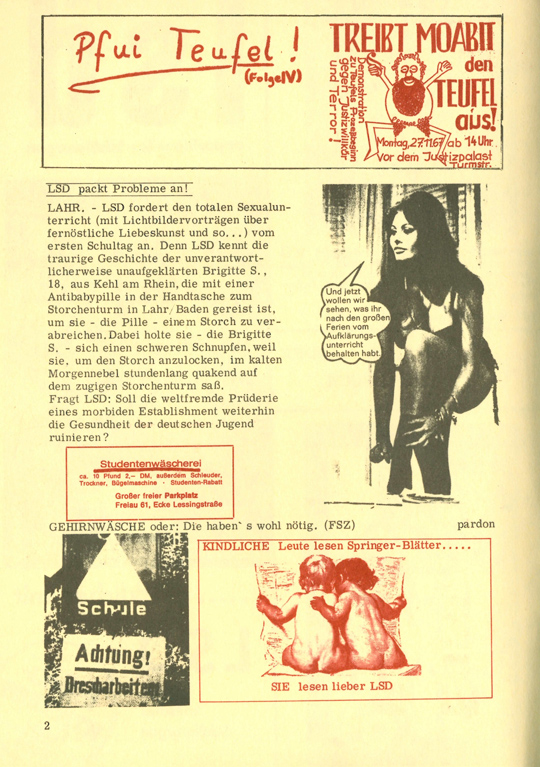Provocative desire
Freiburg, Jun 20, 2018
In France, directors of girls’ schools were checking whether the students’ skirt length was prim enough; in England the school newspapers were reporting on the recent successes of the local cricket team; but in Germany pupils were spraying “take a tumble in bed, not on a gym mat” on gymnasium walls while demanding the pill be made available to minors. The notorious “sexual revolution” of 1968 did not have the same look everywhere – and in some countries the fight for sexuality began much later.

Sexuality and politics: This explosive combination occurred in the 1960s solely in West Germany and was buoyed by the New Left. Photo: michelangeloop/Fotolia
The Rolling Stones rocked the stages with “I can't get no satisfaction” while thousands of people danced and smoked pot to the point of ecstasy for days on end amidst the Woodstock haze. Kommune I shocked the establishment with nude photos in the news magazine “Spiegel” and slogans like “Make love, not war” traveled around the world, making it appear that long-haired, peace-loving hippies had taken the helm in the West. Freiburg historian Dr. Sonja Levsen emphasizes the word “appear,” however. The iconic images of 1968, which were conveyed by the media over the past 50 years, have often led people down the wrong path. “Even historians mainly interpret the ‘sexual revolution’ as a transnational phenomenon – as a phenomenon of the so-called global sixties,” says the private lecturer. Sexual liberation movements, the struggle and riots against the “muff of 1,000 years,” however, did not take place everywhere at the same time and, above all, not in the same way: “Sexuality played very different roles in the protest movements in West Germany, France and Great Britain,” emphasizes Levsen. “It’s worth taking a closer look because it will also help transform our understanding of these societies.”
Pent up energy and fascism
Take the Federal Republic. In West Germany multiple developments ran up to the “sexual revolution”, thereby releasing it from the status as a coy niche phenomenon, explains Levsen: “A key player was the psychoanalyst Wilhelm Reich who associated repressive sexual morality with German fascism.” In the mid-1960s, the population discovered the student of Sigmund Freud and devoured his books. Perhaps the writings offered a satisfying explanation for the gaping wounds from the recent past. After only a few years, it was considered commonplace to view cruel, authoritarian subjects as a result of sexual pent up energy. The new Left ensured the politicization of this line of thinking. In West Germany, at the latest after the prohibition of the KPD in the mid-1950s, it was unrivaled: “The new Left could invent itself without having to reckon with opposition from the left. It had to discover new subjects such as sexuality and make their mark by laying claim to them.”

A slogan travels around the world: The 68ers combined a repressive sexual morality with war and obedient subjects - on the other hand, they promised peace through free sexual expression. Photo: durantelallera/Fotolia
It was quite different in France and England: “There, the left-wing movements around 1968 hardly had anything to do with sexuality,” says the historian. In France, the Old Left dominated events with classic communist themes and also influenced student movements. “The goal of the Communist Party was the class struggle, and homosexuality was simply a perversion of the bourgeoisie. The Conservatives, Catholics, and Communists were united through their clear distancing from the issue of sexuality.” Further north in the UK, the New Left also worked on figures and communist traditions of the 19th and 20th centuries. The slogans were “turning away from Stalinism” and “rethinking classical Marxism.” The British regarded both the sex, drugs and rock 'n roll glorifying Stones and sexual liberation theorists like Herbert Marcuse with a raised brow. “Sexuality was perceived not as liberating, but as a potential threat to social peace.”
Instruction in the cuddle room
Levsen discovered that even the student and school protest movements were not very similar. While nearly 1,000 school newspapers were in circulation – the more radical among them demanding instruction in “lust-boosting sexual practices” and the establishment of “cuddle rooms” – their British neighbors reported on such things as the successful completion of the school roof’s repair job and, at the most, the French school press might politely suggest its “desire” for biologically correct sex education lessons.
The staging of politicized sexuality illustrated in particular how German the phenomenon of “sexual revolution” was. See Kommune I: Rainer Langhans and others were photographed nude and spread their thoughts on free love and orgasmic debauchery for every media savvy occasion. “Such verbally and visually provocative strategies were completely absent in other countries,” says Levsen. In France, there was no comparable cooperative living arrangements to be found. “It also places the public image of the civil unrest in Paris in May 1968 in a different light,” says the researcher. Egalité and fraternité: you bet. Sexuality on the other hand: no dice.

The "Lahr Student Digest“ a.k.a. LSD demands "total sex education". Source: Stadtarchiv Lahr
England did indeed come up with a true commune: “The members of the London Street Commune occupied a house, lived on discarded food and housed the homeless.” This campaign, however, was viewed by the communards as a protest against housing shortages. Sex as a strategy for politicization or provocation did not appear anywhere in the group. Above all, the British protests were directed against the Vietnam War and nuclear weapons, specifies Levsen - and the English and French press hardly reported on the permissive political spectacle of the West Germans.
The limitations of comparison
Sexuality also reached Germany’s Western European neighbors in the 1970s. “However, the debates never took place with the same intensity and sex and politics were never viewed in connection to one another,” says Levsen.
The countries’ juxtaposition shows the limitations of a decades-old explanatory model: “The discovery and politicization of sexuality has been understood thus far as a protest by a young generation against repressive, outdated sexual morality – promoted by mass consumption and youth culture.” Comparative research has revised many of the assumptions about similarities between the protest movements, which are often presented in the media and history books as being lockstep across multiple nations. Instead, questions have begun to emerge about the respective national circumstances. The global sixties must not have been so global after all.
Rimma Gerenstein

